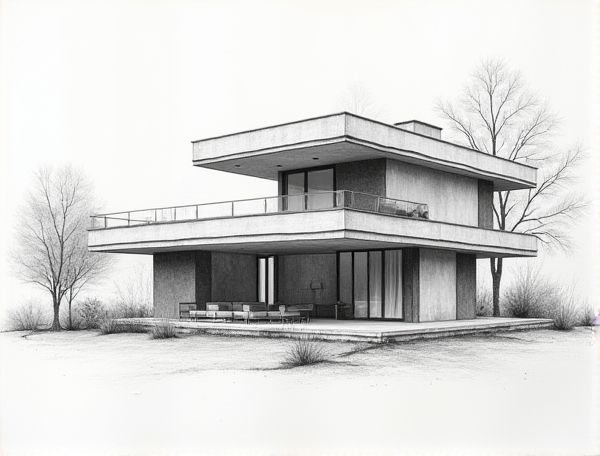
Photo illustration: Bauhaus home design with original 1930s light fixtures
Bauhaus home design emphasizes clean lines, functional forms, and minimalistic aesthetics, creating spaces that balance practicality with artistic expression. Incorporating original 1930s light fixtures adds authentic vintage charm and historical depth, enhancing Your home's unique visual appeal; discover how to seamlessly integrate these timeless elements by reading more in the article.
Introduction to Bauhaus Home Design
Bauhaus home design emphasizes simplicity, functionality, and geometric shapes, blending form and function seamlessly for a modern aesthetic. Your living space benefits from clean lines, open floor plans, and minimalistic decor that prioritize usability without sacrificing style.
The Historical Significance of 1930s Light Fixtures
1930s light fixtures showcase the Art Deco movement's influence, characterized by geometric shapes, chrome finishes, and frosted glass that brought modernity and elegance to home design. These fixtures not only provided functional illumination but also served as iconic decorative elements reflecting the era's optimism and technological advancements in lighting.
Key Principles of Bauhaus Interior Aesthetics
Bauhaus interior aesthetics emphasize functional design, minimalism, and the harmonious integration of form and function, creating spaces that prioritize usability without unnecessary ornamentation. The use of geometric shapes, clean lines, and a limited color palette underscores simplicity and efficiency, while innovative materials such as steel, glass, and plywood promote durability and modernity. Open floor plans and multifunctional furniture exemplify the Bauhaus commitment to maximizing spatial efficiency and fostering a sense of openness in home design.
Identifying Authentic 1930s Bauhaus Lighting
Authentic 1930s Bauhaus lighting showcases sleek geometric forms, minimal ornamentation, and a strong emphasis on function over decoration, making it a hallmark of modernist design. Look for materials like steel, glass, and chrome, which highlight the era's industrial aesthetic and craftsmanship. Your ability to spot original Bauhaus fixtures can elevate your home design with timeless pieces that embody innovation and simplicity.
Integrating Original Fixtures into Modern Homes
Incorporating original fixtures such as vintage doorknobs, antique light switches, and period-specific cabinetry seamlessly enhances the character of modern homes while preserving historical authenticity. These elements create a unique blend of old-world charm and contemporary design, increasing both aesthetic appeal and property value.
Color Palettes and Materials in Bauhaus Design
Bauhaus design emphasizes a minimalist color palette dominated by primary colors--red, blue, and yellow--complemented by black, white, and gray to create visual harmony and simplicity. Materials such as steel, glass, and concrete are integral to Bauhaus interiors, showcasing industrial textures and functional forms that reinforce the style's modernist ethos. These elements together promote a clean, geometric aesthetic that balances form and function seamlessly.
Celebrated Designers Behind Iconic Bauhaus Lights
Iconic Bauhaus lights, designed by celebrated figures such as Wilhelm Wagenfeld and Marianne Brandt, continue to revolutionize modern home lighting with their sleek geometric forms and functional elegance. Their use of innovative materials like glass and metal elevates your home design by blending art with practicality, creating visually striking yet highly efficient lighting solutions. Investing in these legendary designs transforms your living spaces into timeless showcases of minimalist sophistication and architectural brilliance.
Preservation and Restoration of Vintage Light Fixtures
Preservation and restoration of vintage light fixtures involve carefully cleaning, rewiring with modern safety standards, and using period-appropriate materials to maintain their historical authenticity and aesthetic appeal. Skilled artisans often employ techniques such as metal polishing, glass repair, and gentle repainting to revive the original craftsmanship while ensuring functionality in contemporary homes.
Where to Source Authentic Bauhaus Lighting
Authentic Bauhaus lighting can be sourced from specialized retailers like The Bauhaus Center or 20th Century Lighting, known for their curated vintage and reproduction pieces. You can also explore reputable online marketplaces such as Etsy or 1stDibs, which offer a diverse range of original Bauhaus lamps and fixtures crafted by skilled artisans.
Transforming Spaces with Bauhaus Lighting Accents
Bauhaus lighting accents redefine modern home design by merging functionality with minimalist aesthetics, enhancing spatial harmony and visual clarity. Iconic geometric shapes and clean lines emphasize structural elements, creating dynamic focal points that elevate both ambiance and architectural integrity. Incorporating Bauhaus fixtures optimizes natural light interplay, fostering environments that are both visually striking and functionally efficient.
 homedesy.com
homedesy.com